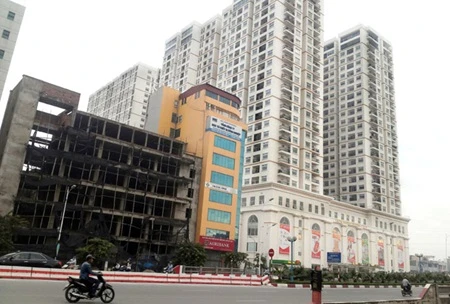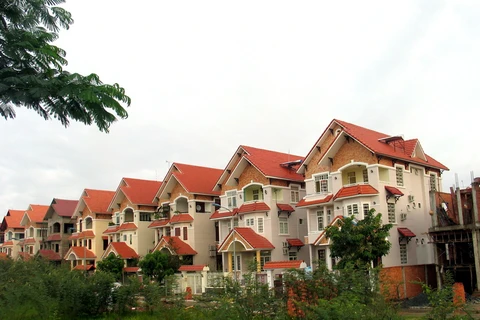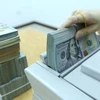Hanoi (VNA) - The Vietnamese property market is entering 2016 after witnessing recoveries of firms in 2015, driven by macroeconomic improvements and policies of openness.
Still, there are concerns about the property market's development. Vietnam News reporters speak to real estate service and consultancy firms, a developer, an association and a bank about the development of the realty market and their expectations.
Mauro Gasparotti, executive director at Alternaty, or Alternative Real Estate Service Co., Ltd: huge investment opportunities
Vietnam is offering the most exciting opportunities in the region, while the regional real estate markets are suffering.
Singapore is feeling the effects of the heavy-handed cooling measures, Indonesia and Malaysia have seen rapid currency depreciation, Thailand continues to grapple with internal issues and Myanmar is seeing significant supply coming into the market, putting downward pressure on rentals and pricing.
Meanwhile, Vietnam has come through an extended period of consolidation, and looks poised to lead the regional real estate markets over the next two to three years.
We believe there are a lot of advantages for Vietnam's property market in an emerging country. One of the main ones is the overall better state of the economy, compared to previous years, leading to stronger confidence in the real estate growth.
A lot of the foreign investors' attention will be directed towards development of infrastructure throughout the country such as new metro in the main cities or upgraded airports in tourist destinations, which will add medium and long-term value to various property sectors.
At a recent conference held in Singapore on Southeast Asia's real estate markets, Vietnam was voted the most favoured real estate market in the region. It is the real estate market that is expected to perform best in 2016, ahead of Thailand, Indonesia and the Philippines, besides Singapore and Myanmar. Regarding foreign capital inflow, I think especially the Trans-Pacific Partnership will be a game changer for Vietnam, to the same order of magnitude that the WTO accession was in 2007.
Apparently, the 12-member TPP, in which Malaysia, Singapore, Japan and Vietnam are members represents 40 percent of the world economy and is expected to be the largest trade deal in this generation. A recent Bloomberg headline said Vietnam might just be the greatest winner in the TPP.
Being part of the TPP and the AEC will lead to significant potential growth in FDI in real estate in the medium to long term. A large part of the foreign investment will be directed into the industrial sector. This will, in turn, drag investment attention to commercial real estate and serviced apartment sectors, thanks to the increase in demand for office leasing space and accommodation needs. It will also affect hospitality, especially city hotels that will benefit from increased demand for business and MICE groups.
In addition, the new residential policies that allow foreigners to own houses will help the Vietnamese property market to be perceived as more transparent and open to foreign investors, compared to the previous years. It will also benefit from acquiring a regional reputation as a safer FDI destination. In the short term, we do expect larger numbers of foreign investors to buy residential properties in Vietnam.
As the number will considerably grow in the medium to long term, it will enhance liquidity in the sector. This will obviously benefit both developers and end-users.
Phan Thanh Huy, CEO of real estate development firm Novaland Group: improved infrastructure and detailed guidelines in need
The property market has achieved significant growth in recent years, as proved by the transaction volumes and rising prices.
We are optimistic the market will continue to grow, thanks to the economic recovery and rapid urbanisation. The increasing per capita income in the large cities of HCM City, Hanoi and Da Nang will further stimulate the market.
The support provided by banks will offer customers more opportunities to buy houses, making the market busier in 2016. All of these reasons, I think, will encourage real estate developers to bring more products into the market.
Along with housing, the retail [shopping] and office segments are also expected to attract interest from developers. Demand in these segments, especially in HCM City, will rise sharply, thanks to the demand from foreign investors who keep pouring money to start or expand their business in Vietnam.
In my opinion, however, inadequate infrastructure will badly affect the development of the market.
Connectivity within and between cities has not been as strong as the development of the real estate market. It has also fallen short of the requirements of urban dwellers whose living standards are improving day by day.
There needs to be a comprehensive transport system to carry out the plan to move people to the suburbs.
We hope infrastructure projects to develop public transport will be speeded up to benefit both real estate developers and the public.
With regard to the segment catering to foreign buyers and Viet Kieu (overseas Vietnamese), the amendments to the Housing Law and Real Estate Business Law that took effect in July 2015 have received a positive signal from the market.
Our experience shows that foreigners and overseas Vietnamese have started taking interest in and are studying the market. However, we think they are still waiting for documents that guide the laws.
If the guiding documents are released soon and can answer their questions and worries, the market will see significant changes in 2016.
Since the day of establishment, we have had a clear strategy of focusing on the medium and luxury segments. This strategy has been developed over many years. This year we will continue to offer customers products at good prices in this segment. In addition, we will keep improving management and after-sales services at our projects. This is our responsibility, and it will strengthen our reputation in the market.
Matthew Powell, Director of Savills Hanoi: residential, office market and M&A will be the highlights
The highlights of the property market in 2016 are expected to be the residential market, the office market and M&A activities.
In general, we have a positive outlook for the residential market in 2016. Macroeconomic factors are predicted to be stable, which will heavily influence the residential demand going forward.
In Hanoi, we see an increased liquidity and rapidly increasing demand – from real end-users and long-term investors – driving the increased transaction volume and the slightly increasing sales prices. One noticeable factor is the increased demand from the provinces and cities around Hanoi. Previously, this was limited to the high-net worth buyers from these areas, but we see a wider range of demand across the high, mid and affordable residential products. The confidence of the ‘average' domestic buyer is much higher. He is the one who drives the market, to distinguish from the super-wealthy who generate most of the headlines, but actually are not the main drivers.
In contrast to several years ago, the active property developers of today are much more experienced, financially capable and understanding of buyers' needs and demands. This is evident in the construction progress, and the increased focus on design, quality and facilities provided by developers. Lending by domestic banks is now much more stringent, but credit is flowing and the market depends on this.
We predict the affordable housing sector will be stable going into 2016. This is being driven more by rising incomes and the high urbanisation rate in Hanoi, all of which create a large and real demand.
In terms of supply, we are tracking 24,000 units in 43 projects in 15 districts of Hanoi, which will enter the market in 2016. This does raise some concern about oversupply in certain districts. But it is very much a commercial and competitive issue for property developers and can only benefit the consumer, and it will increase the value and the facilities being offered. Developers will need to be very conscious of this while competing in the market.
Meanwhile, Vietnam's economy is on the way to recovery, with both the GDP and FDI achieving outstanding growth. This has led to an increase in office demands in large cities such as Hanoi and HCM City. In terms of future supply, the office market in Hanoi will receive 460,000sq.m from 20 projects till the end of 2017, of which the central business districts (CBD) and the western districts will account for most of the future supply. The occupancy rate in Hanoi will see an 11 percent increase in 2016 and 15 per cent in 2017. The positive signals from the stable macro economy have boosted the expansion activities of international companies in Vietnam, along with the outstanding GDP growth that will ensure the stability of domestic companies. In the near future, the demand for office space from foreign companies will increase strongly, as many are looking for office expansion and relocation in Vietnam.
The year 2016 is also expected to be an active year for the M&A market, especially when many developers have gained strong financial capability and experience. Also, the fact that Vietnam is entering the global playground will provide the M&A market with more international developers, who are financially capable and committed to a long-term relationship with Vietnam.
Nguyen Van Duc, Vice President of the HCM City Real Estate Association: risk of market imbalance
The property market signals transparent improvements in the past year. However, I see two existing problems that might cause a market imbalance.
Firstly, there are hundreds of stagnating property projects. In HCM City alone, there are about 500 stagnant projects, resulting in a huge load of debts. Currently, there are no solutions to tackle this problem.
Secondly, property developers are seemingly focusing on high-end residential projects, worth about 2 billion VND to 3 billion VND (89,200 USD-134,000 USD) per unit, while largely ignoring the low-cost segment of below 1 billion VND (44,640 USD) per unit.
I wonder how the market can absorb such a huge supply of luxury apartments, while there is a shortage of houses for low-income earners.
These problems are posing a risk to the property market. It was a supply and demand imbalance that contributed significantly to the property market freeze for years since 2008.
The market imbalance might become a crisis if there are huge fluctuations in the economy, such as soaring bad debts, inflation and the government tightening its belt.
In addition, the anticipated merger and acquisition wave associated with Vietnam's integration process might not be good news.
It can turn out to be a shock not only to the property market, but also to the entire economy, as investors will wait till the property market is down to the bottom to pour money into projects at bargain prices, like what is happening in the retail market that is currently at risk of being dominated by foreign rivals.
The construction ministry’s statistics showed that the number of successful transactions in the first 11 months of 2015 increased by about 80 percent year-on-year, with 17,750 transactions in Hanoi and 17,050 in Ho Chi Minh City.-VNA
























